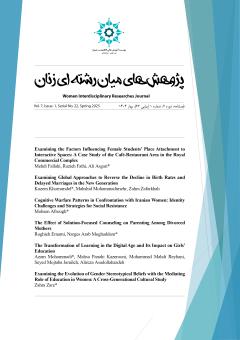Examining Global Approaches to Reverse the Decline in Birth Rates and Delayed Marriages in the New Generation
Subject Areas :
Kazem Khorramdel
1
,
Mahshid Mohammadi mehr
2
,
Zahra Zafarkhah
3
![]()
1 - Assistant Professor, Department of Psychology. Fatemiyeh Shiraz, Institute of Higher Education, Shiraz, Iran.
2 - Master's student in Social Psychology. Department of Psychology, Fatemiyeh Shiraz Institute of Higher Education, Shiraz, Fars, Iran.
3 - Master of Arts in Social Psychology, Fatimah Non-Profit Institute, Shiraz, Fars, Iran
Keywords: Birth rates, marriage, new generation, global approaches.,
Abstract :
Today, many countries in the world face the cognitive demographic challenges of decreasing birth rates and delaying marriages, which can lead to aging populations and labor shortages. Iran is one of the countries affected by these developments. The aim of this study is to identify and examine effective policies that promote marriage and increase birth rates globally. The findings and analyses obtained can serve as a valuable resource for encouraging marriage among younger generations and increasing birth rates in our country. The collection of this data is a systematic review that includes reputable academic research, government publications, and statistical databases from countries that have succeeded in this global challenge that has addressed the subject over the past decade. Based on the information collected, it can be said that financial concerns such as pay increases, tax deductions for families, and care for children with working parents, as well as social support programs such as generous leave for parents, housing priority for couples, and marriage promotion, were identified with the help of initiatives such as social promotion campaigns and the use of media. The study shows promising policy options for Iran, and adjusting these findings to Iran’s cultural and religious conditions and implementing experimental plans prior to national scaling could help curtail the current trend.
